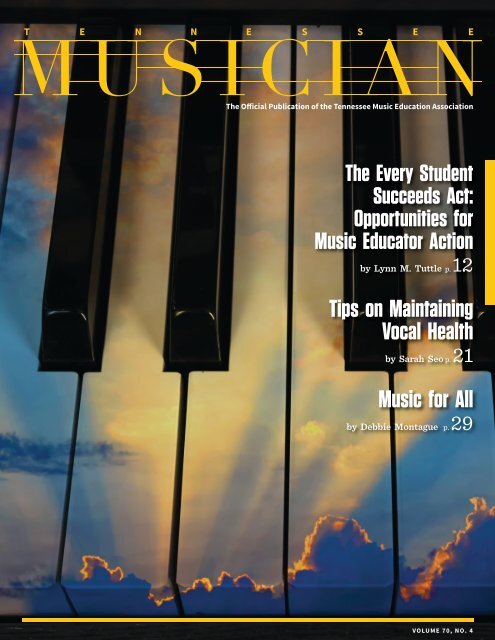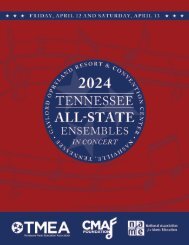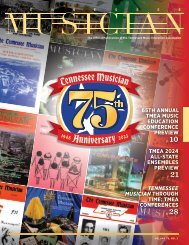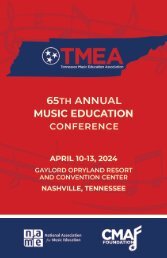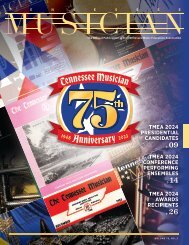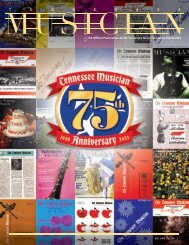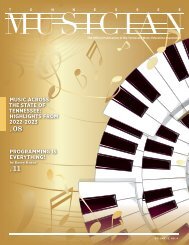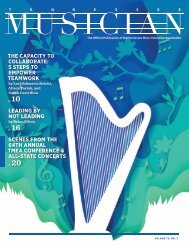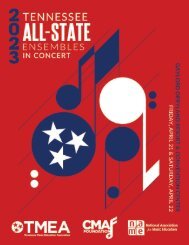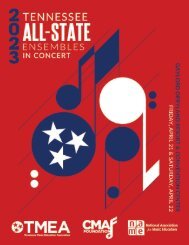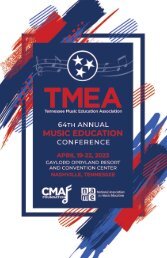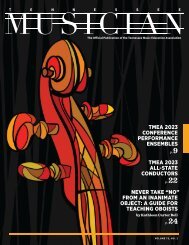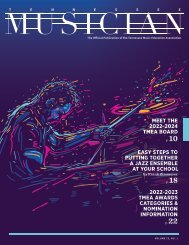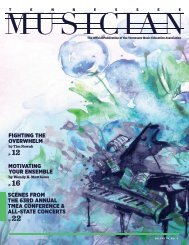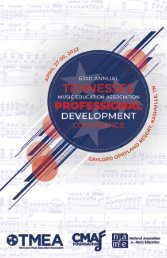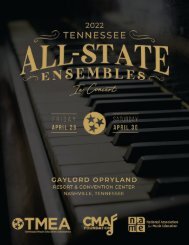TN Musician Vol. 70 No. 4
Create successful ePaper yourself
Turn your PDF publications into a flip-book with our unique Google optimized e-Paper software.
The Official Publication of the Tennessee Music Education Association<br />
The Every Student<br />
Succeeds Act:<br />
Opportunities for<br />
Music Educator Action<br />
by Lynn M. Tuttle p. 12<br />
Tips on Maintaining<br />
Vocal Health<br />
by Sarah Seo p. 21<br />
Music for All<br />
by Debbie Montague p. 29<br />
VOLUME <strong>70</strong>, NO. 4
MUSIC<br />
MUSIC WITH PURPOSE<br />
A Christ-centered university in southeast<br />
Tennessee with faculty, curriculum, facilities,<br />
and opportunities to prepare you for your<br />
goals as tomorrow’s musician.<br />
Audition Dates:<br />
NOV. | JAN. | FEB. | MAR. | APR.<br />
LEEUNIVERSITY.edu/music
TENNESSEE MUSICIAN EDITORIAL STAFF<br />
Michael W. Chester<br />
Managing Editor and Advertising Manager<br />
Justin T. Scott<br />
Associate Editor<br />
Laura Boucher<br />
Associate Style Editor<br />
Jazmin Jordan<br />
Social Media Director<br />
Allison Segel-Smith<br />
Pre-Production Editor<br />
Contributing Editors<br />
Matthew Clark<br />
Doug Phillips<br />
Carol King-Chipman<br />
Jerome Souther<br />
PUBLISHED BY SLATE GROUP<br />
6024 45th Street<br />
Lubbock, Texas 79407<br />
(800) 794-5594 office<br />
(806) 794-1305 fax<br />
Director of Creative Services<br />
Rico Vega<br />
Graphic Design<br />
Kasey McBeath<br />
Account Executive<br />
Ian Spector<br />
TABLE OF CONTENTS | 2018 | VOLUME <strong>70</strong>, NO.4<br />
TMEA President’s Message 4<br />
Johnathan Vest, Ed. D.<br />
TMEA Conference Awards & President-Elect 5<br />
FEATURED ARTICLES<br />
The Every Student Succeeds Act:<br />
Opportunities for Music Educator Action 8<br />
by Lynn M. Tuttle<br />
Tips on Maintaining Vocal Health 16<br />
by Sarah Seo<br />
Music for All 23<br />
by Debbie Montague<br />
Tennessee <strong>Musician</strong> Advertiser Index 31<br />
TMEA Back Then 32<br />
All editorial materials should be sent to: Michael Chester, Managing<br />
Editor (615-873-0605) E-mail: editor@tnmea.org.<br />
Submit materials by e-mail in Microsoft Word format.<br />
Advertising: Information requests and ad orders should be<br />
directed to: Michael Chester, Managing Editor (615-<br />
873-0605) e-mail: editor@tnmea.org. All advertising<br />
information is on the TMEA web site, www.tnmea.org.<br />
Deadlines for advertisement orders and editorial materials:<br />
Issue <strong>No</strong>. 1 – Deadline: August 15 (in home delivery<br />
date October 15); Issue <strong>No</strong>. 2 – Deadline: October 15 (in<br />
home delivery date December 15); Issue <strong>No</strong>. 3 – Deadline:<br />
December 15 (in home delivery date March 15);<br />
Issue <strong>No</strong>. 4 – Deadline: February 15 (in home delivery<br />
date May 15)<br />
Tennessee <strong>Musician</strong> is copyrighted. Reproduction in<br />
any form is illegal without the express permission of<br />
the editor.<br />
Postmaster: Send address changes to: Tennessee <strong>Musician</strong>,<br />
c/o National Association for Music Education<br />
(NAfME), 1806 Robert Fulton Drive, Reston, VA<br />
20191-4348.<br />
The Tennessee <strong>Musician</strong><br />
The Official Publication of the Tennessee Music Education Association<br />
The Tennessee Music Education Association (TMEA) was officially formed in 1945 as a voluntary, nonprofit<br />
organization representing all phases of music education at all school levels. The mission of TMEA<br />
is to promote the advancement of high quality music education for all. Active TMEA membership is<br />
open to all persons currently teaching music and others with a special interest or involvement in music<br />
education. Collegiate membership and retired memberships are available. Membership applications are<br />
available on the TMEA web site, www.tnmea.org.<br />
The Tennessee <strong>Musician</strong> was founded in 1948 with J. Clark Rhodes appointed by the TMEA Board of<br />
Control as inaugural editor. Tennessee <strong>Musician</strong> was preceded by an earlier publication, Tennessee<br />
Music Editors’ Downbeat, which was discontinued by the TMEA Board of Control at the spring board<br />
meeting, held in Chattanooga, Tennessee in 1948. Tennessee <strong>Musician</strong> is published by Slate Group –<br />
Lubbock, Texas and is mailed to members four times each year at an annual subscription rate of $6.00<br />
(included in dues). <strong>No</strong>n-member subscription rate (includes S&H): $30.00 per school year; single<br />
copies: $10.00 per issue<br />
Place non-member subscription and single copy orders at TMEA, 129 Paschal Drive, Murfreesboro,<br />
Tennessee 37128 or e-mail to editor@tnmea.org.<br />
All editorial materials should be sent to: Michael Chester, Editor-in-Chief (615-904-6771 ext. 31600)<br />
e-mail: editor@tnmea.org. Submit materials by e-mail in Microsoft Word format.<br />
<strong>No</strong>n-Profit 501(c)(3) Organization U.S. Postage Paid<br />
at Lubbock, Texas. ISSN Number 0400-3332; EIN<br />
number 20-3325550
TMEA BOARD AND COUNCIL<br />
TMEA OFFICERS 2017-2018<br />
TMEA EXECUTIVE DIRECTOR:<br />
Ron Meers<br />
execdirector@tnmea.org<br />
TMEA PRESIDENT:<br />
Johnathan Vest, Ed. D.<br />
president@tnmea.org<br />
BOARD OF DIRECTORS<br />
TMEA STATE GENERAL MUSIC CHAIR:<br />
Linzie Mullins<br />
genmusicchair@tnmea.org<br />
TMEA STATE CHORAL CHAIR:<br />
Gerald Patton<br />
pattong@rcschools.net<br />
TMEA STATE ORCHESTRA CHAIR:<br />
Michelle Clupper<br />
michelle.clupper@knoxschools.org<br />
TMEA STATE BAND CHAIR:<br />
David Chipman<br />
banddir@bellsouth.net<br />
TMEA STATE HIGHER EDUCATION CHAIR:<br />
Ryan Fisher, Ph. D.<br />
rfisher3@memphis.edu<br />
TMEA COUNCIL<br />
WTGMEA PRESIDENT:<br />
Linzie Mullins<br />
genmusicchair@tnmea.org<br />
WTGMEA PRESIDENT-ELECT:<br />
Frances Miller<br />
fmiller@millingtonschools.org<br />
WTVMEA PRESIDENT:<br />
Lalania Vaughn<br />
lvaughn@rebelmail.net<br />
WTVMEA PRESIDENT-ELECT:<br />
Christopher Davis<br />
davischristophert@gmail.com<br />
WTSBOA PRESIDENT:<br />
Stephen Price<br />
prices@gcssd.org<br />
WTSBOA PRESIDENT-ELECT:<br />
Ollie Liddell<br />
ollie_liddell@hotmail.com<br />
MTGMEA PRESIDENT:<br />
Alexis Yatuzis-Derryberry<br />
derryberrya@rcschools.net<br />
MTGMEA PRESIDENT ELECT:<br />
Lia Holland<br />
liaholland@mtcscougars.net<br />
MTVA PRESIDENT:<br />
Michael Choate<br />
choatem@pcsstn.com<br />
TMEA PRESIDENT-ELECT:<br />
Lafe Cook<br />
pres-elect@tnmea.org<br />
2 | TENNESSEE MUSICIAN | 2017 | <strong>Vol</strong>ume 69, <strong>No</strong>. 2<br />
TMEA PAST-PRESIDENT:<br />
Jeff Phillips, Ed. D.<br />
jeffrey.phillips@sumnerschools.org<br />
TMEA STATE COLLEGIATE NAFME CHAIR:<br />
Jennifer Vannatta-Hall, Ed. D.<br />
jennifer.vannatta-hall@mtsu.edu<br />
TMEA STATE EDUCATIONAL TECHNOLOGY CHAIR:<br />
John Womack<br />
webmaster@tnmea.com<br />
TMEA PUBLICATIONS EDITOR AND<br />
ADVERTISING MANAGER:<br />
Michael Chester<br />
editor@tnmea.org<br />
TMEA PUBLICATIONS ASSOCIATE EDITOR:<br />
Justin Scott<br />
justin.scott@tcsedu.net<br />
TMEA ADVOCACY AND GOVERNMENT<br />
RELATIONS CHAIR:<br />
Christopher Dye, Ed. D.<br />
christopher.dye@mtsu.edu<br />
MTSBOA PRESIDENT:<br />
Debbie Burton<br />
dlburton98@gmail.com<br />
MTSBOA PRESIDENT-ELECT:<br />
Justin Scott<br />
justin.scott@tcsedu.net<br />
ETGMEA PRESIDENT:<br />
Margaret Moore<br />
mamcmoore57@aol.com<br />
ETGMEA PRESIDENT-ELECT<br />
Marcus Smith<br />
marcus.smith@knoxschools.org<br />
ETVA PRESIDENT:<br />
Kenton Deitch<br />
kenton.deitch@knoxschools.org<br />
ETVA PRESIDENT-ELECT:<br />
Stephanie Coker<br />
scoker@acs.ac<br />
ETSBOA PRESIDENT:<br />
Gary Wilkes<br />
gwilkes428@gmail.com<br />
ETSBOA PRESIDENT-ELECT:<br />
Alan Hunt<br />
ahunt@bradleyschools.org<br />
CONFERENCE MANAGEMENT TEAM<br />
TMEA CONFERENCE CO-CHAIR:<br />
Brad Turner<br />
brad.turner@acsk-12.org<br />
TMEA CO-CONFERENCE CHAIR:<br />
Paul Waters<br />
paulwaters.tmea@gmail.com<br />
TMEA CONFERENCE EXHIBITS CHAIR:<br />
Jo Ann Hood<br />
jhood10105@aol.com<br />
ALL-STATE MANAGEMENT TEAM<br />
<strong>TN</strong> ALL-STATE CHORAL GENERAL CHAIR:<br />
Amanda Ragan<br />
aragan@ortn.edu<br />
ENSEMBLE CHAIRS<br />
TREBLE HONOR CHOIR CHAIR:<br />
Tiffany Barton<br />
tntreblechoir@gmail.com<br />
<strong>TN</strong> ALL-STATE SATB ENSEMBLE CHAIR:<br />
Lauren Ramey<br />
lauren.ramey@wcs.edu<br />
<strong>TN</strong> ALL-STATE SSAA CHORALE ENSEMBLE CHAIR:<br />
Amanda Short<br />
amandalovellshort@gmail.com<br />
<strong>TN</strong> ALL-STATE TTBB CHORUS ENSEMBLE CHAIR:<br />
Kelly Davenport<br />
davenportk@wcde.org<br />
<strong>TN</strong> ALL-STATE 9TH - 10TH GRADE STRING<br />
ORCHESTRA CHAIR:<br />
Andy Smith<br />
andy.smith@sumnerschools.org<br />
PROJECT CHAIRS<br />
TMEA MEMBERSHIP CHAIR:<br />
Position unfulfilled at this time<br />
TMEA GUITAR EDUCATION CHAIR:<br />
Chip Henderson<br />
paul.henderson@mtsu.edu<br />
TMEA JAZZ EDUCATION POLICY CHAIR:<br />
Richard Ripani, Ph. D.<br />
richard.ripani@mnps.org<br />
TMEA SOCIETY FOR MUSIC TEACHER<br />
EDUCATION CHAIR:<br />
Jamila L. McWhirter, Ph. D.<br />
jamila.mcwhirter@mtsu.edu<br />
TMEA MUSIC MERCHANTS<br />
INDUSTRY CHAIR:<br />
Rick DeJonge<br />
rick.dejonge@khsmusic.com<br />
TMEA CONFERENCE REGISTRATION CHAIR:<br />
Mark Garey<br />
mgarey86@comcast.net<br />
TMEA CONFERENCE PERFORMANCE<br />
GROUP CHAIR:<br />
John Mears<br />
mearsj@rcschools.net<br />
<strong>TN</strong> ALL-STATE INSTRUMENTAL<br />
GENERAL CHAIR:<br />
Todd Shipley<br />
allstateinstrumental@tnmea.org<br />
<strong>TN</strong> ALL-STATE 11TH - 12TH GRADE SYMPHONIC<br />
ORCHESTRA CHAIR:<br />
Jessica Peck<br />
peck_j@hcde.org<br />
<strong>TN</strong> ALL-STATE 9TH - 10TH GRADE CONCERT<br />
BAND CHAIR:<br />
Carter <strong>No</strong>blin<br />
john.baker@rcstn.net<br />
<strong>TN</strong> ALL-STATE 11TH - 12TH GRADE CONCERT<br />
BAND CHAIR:<br />
J.R. Baker<br />
john.baker@rcstn.net<br />
<strong>TN</strong> ALL-STATE JAZZ BAND CHAIR:<br />
Cord Martin<br />
corderyl.martin@gmail.com<br />
TMEA WEBMASTER:<br />
John Womack<br />
webmaster@tnmea.org<br />
TMEA TRI-M CHAIR:<br />
Anna Laura Williams<br />
anna.laura.williams@outlook.com<br />
TMEA MUSIC IN OUR SCHOOLS<br />
MONTH CHAIR:<br />
Tiffany Barton<br />
tntreblechoir@gmail.com<br />
TMEA HISTORY AND ARCHIVES CHAIR:<br />
Position unfulfilled at this time<br />
TMEA RETIRED TEACHERS CHAIR:<br />
Bobby Jean Frost<br />
bjfrost@aol.com
Compose Your Future<br />
www.etsu.edu/music<br />
www.Facebook.com/ETSUMusic<br />
@GoETSUMusic<br />
• Bachelor of Music Degrees in<br />
Performance, Education, and Jazz<br />
• Nationally recognized classical<br />
and contemporary ensembles<br />
• Competitive scholarships based<br />
on audition
TMEA PRESIDENT’S MESSAGE<br />
Johnathan Vest, Ed. D.<br />
I WANT TO THANK THOSE OF YOU WHO<br />
ATTENDED THE 2018 TMEA CONFERENCE,<br />
AND THANKS TO THOSE WHO COMPLETED<br />
THE POST-CONFERENCE SURVEY.<br />
End of the year concerts. Final exams. Allergies. Cleaning out and<br />
organizing. These are all signs of the end of school! Teachers use this<br />
time to reflect, rejuvenate and take part in professional development,<br />
and hopefully spend some much-needed time with family. It goes by<br />
quickly. Pretty soon, band camps will be in full swing and we will be<br />
planning for the 2018-2019 school year. I challenge all of you (and<br />
myself ) to take time for yourself this summer. We can’t be the best<br />
for our students unless we take care of ourselves.<br />
I want to thank those of you who attended the 2018 TMEA Conference,<br />
and thanks to those who completed the post-conference survey.<br />
Based on the feedback we received from that survey, and from<br />
talking with many of you, the conference was very successful. The<br />
performances, the clinicians and the presenters were all top-notch,<br />
and I hope that you were edified and uplifted both personally and<br />
professionally by having attended. Special thanks to the Country<br />
Music Association for supporting our conference this year.<br />
If you weren’t at the conference, Governor Bill Haslam, Education<br />
C ommissioner Candace McQueen, Country Artist Martina McBride,<br />
and Country Music Association CEO Sara Trahern were on hand<br />
at the General Session to unveil the new Tennessee: State of the<br />
Arts initiative. This competitive grant initiative was developed as<br />
a public- private partnership between the Country Music Association<br />
(CMA) Foundation and the State of Tennessee. I’m proud to<br />
announce that TMEA member Todd Shipley has been hired as the<br />
Music and Arts Grant Program Director/Arts Specialist with the<br />
Tennessee Department of Education. Todd will also serve as the<br />
contact at the Department of Education for all things related to<br />
our discipline. Congratulations, Todd, and we know you will serve<br />
our profession well!<br />
I am so honored to have served our profession as president of this<br />
organization for the past two years. I believe we have done good<br />
work in the past two years; we have developed a partnership with<br />
the Country Music Association, hired a lobbyist and have been more<br />
involved in the legislative process, and we have improved the conference<br />
experience for our students and teachers. I look forward to<br />
the direction that Lafe Cook will lead us as president for the next<br />
two years.<br />
4 | TENNESSEE MUSICIAN | 2018 | <strong>Vol</strong>ume <strong>70</strong>, <strong>No</strong>. 4
TMEA 2018 Award<br />
Winners<br />
Congratulations to the following individuals who received awards<br />
and recognitions at the 61st Annual Conference of the Tennessee<br />
Music Education Association on April 12, 2018.<br />
TMEA Outstanding Administrator: Wincle Sterling, Shelby County Schools<br />
TMEA 25 Year Service Award: Kay Galloway, Tony Cox,<br />
Nita Smith, Michael Hendren, Kimberly White<br />
TMEA 40 Year Service Award: Alan Hunt, Gary Wilkes,<br />
Marsha Hartwein, Debbie McCoy<br />
TMEA Outstanding Administrator: Derek Rushworth, Lookout Valley Middle TMEA Outstanding Young Music Educator: Douglas Young, Munford High School<br />
High School<br />
Congratulations to President-Elect Alexis Yatuzis-Derryberry<br />
Congratulations to TMEA President-Elect Alexis Yatuzis-Derryberry!<br />
She will become the 38th president of the Tennessee Music Education<br />
Association when she takes office during the academic year 2020.<br />
As a recognized servant-leader and musician, she has been active in<br />
music education since 2002 and was most recently the recipient of<br />
the Country Music Association (CMA) Foundation Music Teachers<br />
of Excellence Award.<br />
Experience<br />
Music the within<br />
2017-2018 Audition Dates<br />
Junior/Senior Day Monday, Feb. 19, All Day<br />
Woodwind Day Saturday, Feb. 24, All Day<br />
REGISTER TO AUDITION HERE:<br />
utm.edu/audition<br />
Additional dates upon request.<br />
Accredited by the National Association of Schools of Music<br />
(731)881-7402 • music@utm.edu • utm.edu/music
Training the modern musician.<br />
Our flexible programs let you<br />
study what you love, traditional<br />
or folk, with curriculum designed<br />
to teach you what you need.<br />
Synthesize your music degree<br />
with courses in<br />
• Music Entrepreneurship<br />
• Performance Production<br />
• Arts and Society<br />
• and more<br />
DEGREE OPTIONS INCLUDE<br />
Bachelor of Arts: Music<br />
With minors including:<br />
• nonprofit management<br />
• psychology<br />
• business<br />
Bachelor of Music: Performance<br />
Bachelor of Music: Education<br />
Visit utc.edu/music for details.<br />
UTC is a comprehensive, community-engaged campus of the UT System. UTC is an EEO/AA/Titles VI & IX/Section 504/ADA/ADEA institution.
y Frank M. Diaz<br />
THE EVERY STUDENT SUCCEEDS ACT:<br />
Opportunities for Music Educator Action<br />
by Lynn M. Tuttle<br />
As we approach the first year of full implementation of the Every Student<br />
Succeeds Act (ESSA), what should music educators monitor regarding their<br />
school, district and state ESSA work, and what opportunities can they act on<br />
within their school, their district, and their state? As with any new law, there<br />
are many possibilities and opportunities, but, as is always the case, the devil<br />
is in the details. Where to start?<br />
8 | TENNESSEE MUSICIAN | 2018 | <strong>Vol</strong>ume <strong>70</strong>, <strong>No</strong>. 4
Music in State<br />
ESSA Plans<br />
Music/Arts in<br />
Accountability?<br />
Music/Arts in<br />
Dashboards/Report<br />
Cards?<br />
Music/Arts in<br />
Title IV?<br />
Music/Arts support<br />
Professional<br />
Development?<br />
Music/Arts – 21 st<br />
Century Learning<br />
Community<br />
Centers?<br />
Music/Arts for<br />
Homeless Children<br />
and Youth?<br />
Music/Arts resources<br />
for Schools in<br />
Improvement?<br />
Connecticut ✔ ✔ ✔<br />
Delaware<br />
✽<br />
District of<br />
Columbia<br />
✔ ✔ ✔<br />
Illinois ✔ ✔ ✔ ✔ ✔<br />
Louisiana<br />
Maine<br />
Massachusetts<br />
Michigan<br />
Nevada<br />
New Jersey<br />
New Mexico<br />
Tennessee<br />
Vermont<br />
✔ ✔ ✔ ✔<br />
✔<br />
✔ ✔ ✔<br />
✔<br />
✔<br />
✔<br />
✔<br />
✔ ✔<br />
✔<br />
✔<br />
* Delaware is given an asterisk, for while music and arts education is not directly mentioned in the state ESSA plan, the Delaware Department of<br />
Education acknowledged the need to address issues raised by the music and arts education community and has committed to working with advocates on<br />
guidance or other support materials in the future.<br />
STATE-LEVEL IMPLEMENTATION<br />
With a new leader for federal education now in place, U.S. Secretary of<br />
Education Betsy DeVos, we know more about how states will engage<br />
with ESSA implementation. And what we know is that the states can<br />
choose what they do and how they do it. Given the increased responsibility<br />
and flexibility handed to the states regarding ESSA, here are<br />
some tips on for what is going on at the state level, and some ideas<br />
about how you can get involved.<br />
1<br />
Know what’s possible. Thirteen states sent their state<br />
plans to the U.S. Department of Education for approval<br />
by the April deadline. If you are in one of those states<br />
(see the table below), review the plan and see what your<br />
state has already included for music and arts education in<br />
your state plan. If you reside in Arizona, <strong>No</strong>rth Dakota, or Oregon,<br />
you may be aware that those states have also submitted as of<br />
the May deadline, and NAfME is reviewing those plans currently for<br />
information on where music education is supported in those plans.<br />
Contact lynnt@nafme.org for more information.<br />
As you can see by this table, many states have included<br />
music and arts education within their plans, particularly<br />
in the areas of accountability and funding under Title<br />
2 IV, Part A (see below for more information on Title IV).<br />
Share this information with your district, and thank<br />
your state education leaders for including music and arts<br />
education. If the information isn’t clear, or you have questions, don’t<br />
hesitate to contact your state education department to learn more<br />
about how they will support music and arts education via ESSA. You<br />
can find your state’s ESSA page and its plan here: http://www.nafme.<br />
org/advocacy/ESSA/<br />
Tennessee Music Education Assocation | www.tnmea.org | 9
Stay in touch with your MEA’s state advocacy leadership<br />
and NAfME policy staff. Working with our Advocacy<br />
Leadership Force members in the states and<br />
sharing information between the states, the NAfME<br />
policy staff are always happy to help connect you into state<br />
level advocacy and help you share your expertise and advocacy ideas<br />
and suggestions. You can find your state advocacy leaders here: http://<br />
www.nafme.org/advocacy/essa/nafme-advocacy-leadership-force/. We<br />
suggest that you connect with your MEA leadership and learn how<br />
to get involved with the creation, revision and updates to your state’s<br />
ESSA plan. And you can reach the NAfME policy staff here: http://<br />
www.nafme.org/about/staff/advocacy-policy/<br />
Know how your state is going to manage their Title<br />
IV, Part A funds. For this first year of ESSA implementation,<br />
Congress did not fully fund the new federal block<br />
4<br />
grant, which can support a well-rounded education, including<br />
music. The amount funded is small enough that<br />
Congress, for this year only, is allowing states to run competitive<br />
grants for Title IV funds instead of granting those funds out directly<br />
to districts. A state, for example, could focus the funds for certain<br />
areas of a well-rounded education or certain areas of educational<br />
technology, and then create a competitive grant application process<br />
where districts would have to compete against each other to receive<br />
the limited funds. In other words—the funds just won’t flow down to<br />
your district; your district might need to compete for the funds. You<br />
need to know what your state is planning to do and how it will handle<br />
these funds, as it will influence your work at the local level. You can<br />
reach out to your SEADAE member – the arts education consultant for<br />
your state—to find out more. A list of state arts education consultants<br />
can be found at www.seadae.org.<br />
DISTRICT-LEVEL IMPLEMENTATION<br />
Be prepared for Title IV opportunities for music education<br />
within your district. ESSA includes a new funding<br />
1<br />
3<br />
opportunity for music education in Title IV-A, or chapter<br />
4—21st Century Schools. This section of the law is<br />
greatly revised from prior versions, and includes a block<br />
grant, or direct funding to school districts, for supporting<br />
a well-rounded education. Because music is listed in the definition<br />
of a well-rounded education, music education can be supported by<br />
these block grant funds, with two caveats: one, music education needs<br />
have been identified through a district-wide needs assessment and<br />
two, these local, identified needs are not currently met with state and<br />
local funding, so would benefit from supplemental, federal funding.<br />
I encourage you to get involved in the Title IV needs assessment for<br />
your school district. And NAfME has a built-in tool to help you do<br />
that – the 2015 Opportunity-to-Learn Standards (OTLs). The OTLs<br />
list what resources are needed to carry out a quality music education<br />
program—everything from technology to facilities and instruments<br />
to student:teacher ratios. You can find the OTLs for your use with<br />
your district’s needs assessment for music/Title IV here: http://www.<br />
nafme.org/my-classroom/standards/<br />
And understand if the Title IV opportunity will be a block<br />
a grant to your district—or something for which you will have<br />
to apply. As noted above, states will have the option this<br />
year to compete for the Title IV funds instead of just giving them to<br />
your school district. Therefore, you will need to know how your state<br />
is handling the funds and if you can and should respond with a grant<br />
application to the state in order to receive supplemental funds from<br />
ESSA for music education (and other well-rounded subject areas)<br />
for your district. The competitive grants will most likely be available<br />
starting in the fall, so contact your SEADAE member (www.seadae.<br />
org) to learn more about what your state plans to do.<br />
Ask for professional development support, which can be<br />
funded for music educators under ESSA. Funds from<br />
Titles I, II, and IV of ESSA can support professional<br />
2 development for educators, administrators and other<br />
school personnel. With the inclusion of music within<br />
the well-rounded education definition in the law, music<br />
educators are able to have professional development funded by these<br />
dollars now, too. As is the case with the Title IV funding, professional<br />
development funds will be prioritized for areas identified as having<br />
needs based on a district-wide needs assessment. So get engaged,<br />
and ask to be part of your district’s professional development needs<br />
assessment team for ESSA.<br />
SCHOOL-LEVEL IMPLEMENTATION<br />
Understand how music education can now be supported<br />
under Title I of ESSA if you teach at a Title I School.<br />
1<br />
The language for Title I schools has changed in ESSA<br />
to reflect the importance of a well-rounded education.<br />
Title I schools come in two varieties—schoolwide Title<br />
I schools and targeted assistance Title I schools. For the<br />
first time under ESSA, schoolwide Title I schools are encouraged to<br />
include information on how they provide well-rounded educational<br />
opportunities, including music education, to their students in their<br />
written Title I schoolwide plan. While this doesn’t necessarily mean<br />
Title I funds will support those well-rounded educational opportunities,<br />
it’s the first time that schools have been encouraged to include<br />
a wider range of curricular offerings beyond the tested subject areas<br />
within their Title I schoolwide plans. Also for the first time under<br />
ESSA, targeted-assistance Title I schools can use their supplemental<br />
federal Title I dollars to support well-rounded educational opportunities,<br />
including music, for their identified students. At targeted-assistance<br />
Title I schools, students receiving support through a Title I<br />
program are identified as the most academically at-risk students in<br />
their school based on academic achievement indicators, usually the<br />
tested subject areas. Traditionally, Title I funds in targeted- assistance<br />
schools have funded supplemental interventions in the tested<br />
subject areas. Under ESSA, well-rounded educational opportunities<br />
may also be funded for these identified students.<br />
a<br />
If you teach at a Title I schoolwide school, ask how music<br />
will be included in the 2018–2019 schoolwide plan as part<br />
of a well-rounded education. You can even offer to write<br />
10 | TENNESSEE MUSICIAN | 2018 | <strong>Vol</strong>ume <strong>70</strong>, <strong>No</strong>. 4
share information with parents during assemblies, concerts and performances.<br />
NAfME has a concert-flyer resource for your use to help<br />
your parents better understand ESSA, too. You can find the flyer here:<br />
http://www.nafme.org/advocacy/5-ways-to-support-your-music-program/<br />
CONCLUSION—AND THANK YOU!<br />
While the above list might look daunting, we wouldn’t be able to share<br />
this variety of opportunities with you about the new federal education<br />
law if you hadn’t done your part with your fellow music education<br />
advocates and convinced Congress to include music in ESSA. The<br />
opportunities listed here are because of the work you undertook over<br />
the last decade to speak out about the importance of music education.<br />
To make those opportunities become a reality, work now needs to<br />
occur at the state, district, and school levels. You don’t have to do all<br />
of this—pick a place to focus and start there. And thank you again for<br />
making these opportunities possible. We look forward to learning<br />
what you do with them during this school year!<br />
Lynn M. Tuttle currently serves as the Director of Public Policy<br />
& Professional Development for the National Association for Music<br />
Education (NAfME).<br />
that section of the plan if that’s okay—so that music gets listed and<br />
recognized as part of what your school does to support a quality education<br />
for all its students. [NOTE: your administrator may not even<br />
know that this is supposed to happen under the new law, so be ready<br />
to educate as well as ask!]<br />
If you teach at a Title I targeted-assistance school, consider<br />
how supplemental music education could support<br />
b<br />
the students identified as academically at risk. How else<br />
could you support them? How would these supports help them with<br />
the tested subject areas? Sharing this kind of information with your<br />
principal may help you access these dollars, and, more important,<br />
provide quality supplemental services to these students as they work<br />
to thrive in all aspects of their education.<br />
And don’t be shy about reminding your administrator at your<br />
c Title I school that ESSA provides protection from students<br />
missing music to receive remediation. Like <strong>No</strong> Child Left<br />
Behind (NCLB), ESSA retains language in Title I that discourages<br />
schools from providing interventions or remediation for students<br />
by pulling them out of “the regular classroom.”<br />
Share with your school leadership how music helps parents<br />
be engaged with your school. A large part of what<br />
2 schools are asked to do that receive ESSA funding is to<br />
make certain parents are engaged with the school. Music<br />
education is a place where this occurs through our performances,<br />
our parent volunteers and our parent boosters. You<br />
can help your school meet its parental engagement goal simply by<br />
sharing how many parents you reach—or by offering to help the school<br />
Elementary, Middle, and High School<br />
Band, Choir, and Orchestra<br />
2018:<br />
April 20-21<br />
April 27-28<br />
May 4-5<br />
2019:<br />
April 12-13<br />
April 26-27<br />
May 3-4<br />
www.SMMFestival.com<br />
or call:1-855-766-3008<br />
Tennessee Music Education Assocation | www.tnmea.org | 11
Photo Credit: Rob Davidson<br />
Get the National Recognition<br />
Your Music Program Deserves!<br />
Apply to be designated by<br />
The NAMM Foundation as a<br />
Best Community for Music<br />
Education (BCME) program<br />
The 2018 BCME Survey<br />
is open from<br />
October 17–January 31<br />
“Being named a BCME was the catalyst for us to gain an<br />
expanded music education budget, all while increasing<br />
community visibility and support. It was a wonderful<br />
recognition of the efforts of our music staff to provide<br />
the highest quality of music education possible and<br />
further provided validation of the quality of<br />
programs we provide for our students.”<br />
-LONNIE STOVER, SUPERVISOR OF MUSIC AT<br />
SYCAMORE COMMUNITY SCHOOLS IN CINCINNATI, OHIO<br />
Stay Connected<br />
Sign up to receive<br />
The NAMM Foundation monthly<br />
newsletter to receive updates on<br />
Talking Up Music Education podcast<br />
episodes, community events,<br />
music making opportunities, and<br />
educational downloads.<br />
Music Education Days at<br />
The 2018 NAMM Show<br />
Music educators are eligible to attend<br />
The 2018 NAMM Show to participate in<br />
informative sessions; to experience inspiring<br />
performances; and to preview the latest<br />
instruments, products and tools relevant<br />
to today’s music classrooms.<br />
Be part of The NAMM Foundation<br />
The NAMM Foundation provides grants,<br />
supports research and engages in advocacy<br />
to support music making across the<br />
lifespan. Learn how you can be part of<br />
our mission to ensure access to<br />
music education for all at<br />
nammfoundation.org/get-involved.<br />
VISIT NAMMFOUNDATION.ORG/BCME TO LEARN MORE AND TO COMPLETE THE SURVEY
Some are born with<br />
If authenticity had a<br />
soul, you would find it<br />
in Memphis. Creativity<br />
flows through our veins<br />
This is the kind of city and<br />
university where original<br />
people are elevating the art<br />
of music in unforgettable<br />
ways. If you were born<br />
with music in your blood,<br />
you belong at the UofM.<br />
DEGREES OFFERED<br />
B.M., M.M., D.M.A., Ph.D.<br />
AUDITION DATES<br />
Dec. 1, 2018<br />
Feb. 2, 2019<br />
Feb. 16, 2019<br />
Feb. 23, 2019<br />
in their souls<br />
memphis.edu/music
Next level<br />
Our reputation for excellence in design was built stitch by stitch,<br />
evolving into a collection of designs that are contemporary with a classic look,<br />
exuding style and innovation with an unsurpassed custom fit.<br />
Director of Sales<br />
Becky Still<br />
800.826.2246<br />
btstill@shighway.com<br />
www.stanbury.com
16 | TENNESSEE MUSICIAN | 2018 | <strong>Vol</strong>ume <strong>70</strong>, <strong>No</strong>. 4
TIPS ON<br />
MAINTAINING<br />
VOCAL<br />
HEALTH<br />
by Sarah Seo<br />
Vocal health is extremely important for singers of<br />
all ages and musical styles. As a vocalist, I carry<br />
my instrument with me at all times. And as a<br />
teacher, a huge part of my job becomes teaching<br />
my students how they can keep their voices healthy. After<br />
all, if we break our instrument, we can’t just go out and<br />
buy another one!<br />
My students are constantly getting sick. It never fails that<br />
at least one of my kids will have the sniffles each week.<br />
Since I’m in contact with these little ones every day, I’m<br />
consistently subjected to their germs, not to mention<br />
the germs of their friends that they have been in contact<br />
with all day at school. It is part of my job to encourage<br />
my students to keep their voices safe. Children’s vocal<br />
chords are still developing and fragile, so they are very<br />
susceptible to damage. As their voice teacher, I take this<br />
responsibility personally.<br />
It is just as important to keep my vocal chords safe as it<br />
is to help my students protect theirs. Without my voice,<br />
doing my job is extremely difficult. I experienced this<br />
first-hand recently when I caught the flu. Within only a<br />
couple days of trying to carry on with my normal schedule,<br />
my voice decided it was time to quit! Naturally, I wanted<br />
to keep working. So, I had to think about how to take<br />
care of my voice while continuing to teach. Obviously,<br />
I felt incredibly silly being a voice teacher who lost her<br />
voice, so hopefully my experience and tips can benefit<br />
you. Because colds, viruses, and allergies are part of life,<br />
I feel compelled to share some tips on how to proactively<br />
keep you and your vocal chords healthy. I created this list<br />
mostly as a reminder since these aren’t all revolutionary<br />
concepts, but I also included some suggestions on how to<br />
apply them that may prove useful.<br />
Tennessee Music Education Assocation | www.tnmea.org | 17
STAY HYDRATED<br />
Staying hydrated is one of the most important parts of keeping vocal<br />
chords healthy. When you sing, your vocal chords are vibrating against<br />
each other to create sound. Amazing, right? But if they are dry, you<br />
can strain and/or lose your voice since there is not enough lubrication<br />
to allow easy and even vibration.<br />
Obviously, the easiest way to stay hydrated is to drink plenty of fluids!<br />
Carrying a water bottle is an easy way to help you stay hydrated.<br />
Throughout the day, I find that I am often thirsty, but if I do not have<br />
a drink with me, I will not drink anything. Conversely, on the days<br />
that I have a water bottle with me, (or any drink for that matter) it<br />
does not take long for me to finish it.<br />
It is important to note that not all drinks are created equal. Just because<br />
it is a liquid does not mean that it will help keep your body<br />
hydrated. Carbonated, caffeinated, and alcoholic beverages will dehydrate<br />
you. Drink these in moderation, and definitely stay away from<br />
them if you are sick. I must admit that I drink at least one cup of coffee<br />
a day, but I follow it with a glass of water to help replenish myself. If<br />
you do not like drinking a lot of water because you like flavored drinks,<br />
having packets of low calorie drink mixes on hand is an easy fix!<br />
DON’T CLEAR YOUR THROAT<br />
The first thing I want to do when I get a cold is clear my throat. I<br />
hate the feeling of “gunk” on my vocal chords! Having mucus on your<br />
vocal chords can cause problems like dehydration, slight swelling,<br />
irritation, and difficulty speaking or singing, but clearing your throat<br />
is the worst way to handle it. It causes more irritation and can cause<br />
enough swelling to lose your voice. Instead of clearing your throat,<br />
try drinking hot tea, swallowing hard, or some healthy vocal warmups<br />
– sometimes the vibrating of your vocal chords from singing is<br />
enough force to shake loose the yuckiness!<br />
One of my favorite warm-ups to shake loose mucus is sliding up and<br />
down from do-sol-do on the consonants V or Z. Sliding between notes<br />
is helpful, but adding the consonant makes it even better for helping<br />
to clear your voice. Singing on a voiced consonant puts a little extra<br />
pressure (good pressure) on your chords. You can experience this by<br />
singing the same exercise on “Ah” and then repeat it on a voiced consonant<br />
(z, v, m…). Can you feel the difference? V and Z are also great<br />
because there is even more pressure added from having to force air<br />
through either your lips and teeth, or tongue and teeth.<br />
I am sure that I am “preaching to the choir,” but if it hurts to sing, do<br />
not sing! This means that your vocal chords are experiencing more<br />
than just a little mucus. In the case that it is uncomfortable to sing,<br />
your body is telling you that it is time to stop. At this point, resting<br />
your voice is the best option.<br />
USE YOUR INSIDE VOICE<br />
Your normal speaking voice is, for the most part, the healthiest volume<br />
for your voice. Whispering and yelling, alike, are both stressful<br />
on your vocal chords. Yes, even whispering puts stress on your voice.<br />
I often hear people whispering when they begin to lose or have lost<br />
their voice because they assume the softer volume is better. This is a<br />
big misconception. Whispering will not help. Whispering and yelling<br />
once in a while will, obviously, not damage your vocal chords. Consistent<br />
strain, though, can result in damage; so it is beneficial to think of<br />
strategies that minimize the number of times your voice is strained.<br />
YOUR NORMAL SPEAKING<br />
VOICE IS, FOR THE MOST<br />
PART, THE HEALTHIEST<br />
VOLUME FOR YOUR VOICE.<br />
WHISPERING AND YELLING,<br />
ALIKE, ARE BOTH STRESSFUL<br />
ON YOUR VOCAL CHORDS.<br />
As a teacher, it is important to remember not to attempt to talk over<br />
the students. Raising your voice will leave you and your vocal chords<br />
tired. Your students will also become accustomed to hearing your<br />
voice at that volume and you will probably find yourself shouting<br />
a lot. Teaching them to respond to a clapped rhythmic pattern, like<br />
a call and response, is one of the most affective techniques I have<br />
learned. This way, you are able to grab the attention of the class without<br />
straining your voice, and you can then say what you need to say<br />
at a reasonable volume. Speaking at a normal volume is helpful for<br />
preventing vocal strain, but if your voice is about to go, the best thing<br />
to do is stop talking altogether – which brings me to my next point…<br />
STOP TALKING<br />
If you are losing or have already lost your voice, staying on vocal rest<br />
is the most important part of recovery. Especially if you have already<br />
lost your voice, whispering and talking in general will only prolong<br />
your laryngitis. Like I stated above, when it is painful to sing, it is a<br />
good time to give your voice a break. Staying on vocal rest gives your<br />
vocal chords a chance to heal and reduce the swelling.<br />
This information is important for us as teachers to remember and<br />
apply. It is incredibly difficult to teach on vocal rest, but not impossible.<br />
On the days you feel like your voice needs some TLC, use more<br />
gestures and less vocal prompts. Planning lessons that involve more<br />
written exercises and less vocal instruction or demonstration can<br />
be used to your advantage. Also, the days when you want to rest your<br />
voice can be great days to practice rhythm. Clapping rhythms does<br />
not involve using your voice at all. Be diligent with staying on vocal<br />
rest. It is definitely difficult, but not only is it the best for your voice,<br />
your diligence models good vocal habits to your students.<br />
DON’T OVER-SING<br />
Another concept to teach your students is the importance of singing<br />
with each other, not over each other. Sometimes students have<br />
difficulty hearing themselves while singing with others. The natural<br />
reaction is to sing louder until they can hear their own voice. Usually,<br />
18 | TENNESSEE MUSICIAN | 2018 | <strong>Vol</strong>ume <strong>70</strong>, <strong>No</strong>. 4
they do this without even realizing it, but they leave with a tired and<br />
sore throat. Choosing warm-ups that address blending and listening to<br />
each other can help keep them from straining. Even closing their eyes<br />
while singing can help the students become more aware of the volume<br />
of their own voices and of the voices of the people around them.<br />
The best way to help your students with vocal health is not only educating<br />
them, but modeling the behavior as well. If you teach them<br />
about staying hydrated and they see you with a water bottle, they will<br />
be more likely to apply it to their own lives because they see you doing<br />
it. Take a day to talk specifically about vocal health. Then, reinforce<br />
those concepts periodically.<br />
As I said at the beginning of this article, I speak from personal experience.<br />
I am finally gaining the high register of my voice back, even<br />
after months of my speaking voice returning to “normal.” I was afraid<br />
that my singing voice would never return to normal. This is why I am<br />
adamant about maintaining vocal health. To my students, losing their<br />
voices might seem trivial, but it is my job to teach them that prolonged<br />
unhealthy vocal habits can cause serious issues. Hopefully these tips<br />
will be helpful and useful to you as well.<br />
Sarah Seo grew up, and currently resides, in the metro-Atlanta area.<br />
She earned a Bachelor’s degree in Music Therapy at Georgia College<br />
and State University in Milledgeville, Ga., where she graduated<br />
Summa Cum Laude and became a member of the Phi Kappa Phi<br />
Honor’s Society. She completed her internship in Columbia, S.C., at<br />
Palmetto Health Baptist Hospital. Sarah is a member of the American<br />
Music Therapy Association, the Music Therapy Association of<br />
Georgia, and is board certified. Her main instrument is voice and she<br />
has performed as a soloist at a variety of venues, but she is proficient<br />
on guitar and piano. She now teaches voice, piano, and guitar lessons.<br />
She also practices music therapy at various facilities. This article was<br />
first published in Choral Director magazine. For a free subscription<br />
to Choral Director please go to http://www.choraldirectormag.com/<br />
D EPARTMENT OF<br />
Music<br />
Clarksville, Tenn.<br />
BACHELOR OF MUSIC DEGREES<br />
Music Education<br />
Performance (Instrumental, Vocal,<br />
Composition)<br />
BACHELOR OF ARTS/SCIENCE<br />
DEGREE IN MUSIC<br />
Liberal Studies*<br />
*Pave your way to success with<br />
a customizable music degree plan!<br />
MASTER OF MUSIC<br />
Music Education<br />
Performance (Instrumental, Vocal,<br />
Composition, Conducting)<br />
THE APSU MUSIC EXPERIENCE OFFERS<br />
•Individualized instruction by<br />
outstanding faculty<br />
•Nationally recognized 600-seat<br />
concert hall<br />
•Tennessee Center of Excellence for<br />
the Creative Arts<br />
•20 vocal and instrumental student<br />
ensembles<br />
For Audition Dates and Requests Please Visit<br />
www.apsu.edu/music/auditions<br />
Contact : Department of Music<br />
931-221-7808 • music@apsu.edu<br />
THINK MUSIC -- THINK AUSTIN PEAY<br />
www.apsu.edu/music<br />
•Summer graduate program<br />
•Beautiful campus and friendly<br />
environment<br />
Austin Peay State University does not discriminate on the basis of race, color, religion, creed, national origin, sex, sexual orientation, gender identity/expression, disability, age,<br />
status as a protected veteran, genetic information, or any other legally protected class with respect to all employment, programs and activities sponsored by APSU.<br />
http://www.apsu.edu/files/policy/5002.pdf<br />
Tennessee Music Education Assocation | www.tnmea.org | 19
MusicatTech<br />
Scholarship<br />
Audition Dates<br />
Jan. 26, 2018<br />
Feb. 16, 2018<br />
March 16, 2018<br />
Tennessee Tech University<br />
School of Music<br />
Box 5045<br />
Cookeville, <strong>TN</strong> 38505<br />
phone: (931) 372–3161<br />
email: music@tntech.edu<br />
Member of<br />
NASM<br />
since 1967<br />
Taylor Robinson and Gavin Robertson study with Dr. Rachel Rodriguez. | Photo by Warren LaFever.<br />
• We offer degrees in music education and performance.<br />
Tennessee Tech University is part of the State University and Community<br />
College System of Tennessee. TTU does not discriminate on the basis of race,<br />
color, religion, creed, national origin, sex, sexual orientation, gender identity/<br />
expression, disability, age, status as a protected veteran, genetic information,<br />
or any other legally protected class. For inquiries regarding non-discrimination<br />
policies, contact equity@tntech.edu. The TTU policy on nondiscrimination<br />
can be found at www.tntech.edu/aa<br />
• Scholarships are available for both music majors and<br />
non–music majors.<br />
• Hundreds of events each year feature our bands, choirs,<br />
orchestras, soloists, and chamber ensembles.<br />
• Call or email to schedule a campus visit. We’d love to meet<br />
you!<br />
WWW.<strong>TN</strong>TECH.EDU/MUSIC
Tennessee Music Education Assocation | www.tnmea.org | 21
TAKE A LEAD IN YOUR PROFESSION AS A MUSIC EDUCATOR.<br />
SHARE YOUR BEST PRACTICES AND TEACHING TIPS.<br />
PRESENT A WEBINAR TODAY!<br />
Have a great idea to share? Submit your proposal today:<br />
bit.ly/NAfME-PD-Webinars<br />
Questions? Email JJ <strong>No</strong>rman at johnn@nafme.org<br />
IT’S A NEW ERA<br />
IN EDUCATION<br />
<strong>No</strong>w more than ever, your voice and expertise as a music educator is critical. NAfME is here to help you make a<br />
strong case for music education under the Every Student Succeeds Act (ESSA).<br />
On NAfME’s “Everything ESSA” resource page (bit.ly/EverythingESSA), you can find all the toolkits you need to<br />
understand ESSA and take action to ensure implementation includes music at the state level.<br />
At bit.ly/EverythingESSA, you can also receive recognition for professional development valued at one contact<br />
hour for watching advocacy webinars.<br />
And in the Grassroots Action Center (bit.ly/NAfMEgrassroots), you can make your voice heard on Capitol Hill.<br />
Your Association. Your Profession. Your Voice.<br />
22 | TENNESSEE MUSICIAN | 2018 | <strong>Vol</strong>ume <strong>70</strong>, <strong>No</strong>. 4
MUSIC FOR ALL<br />
by Debbie Montague<br />
As a music educator for over 40 years, I have experienced<br />
many changes in public school education. One change that<br />
has greatly impacted the classroom environment has been<br />
an increase in the number of students in my classes who<br />
have special needs. In the 19<strong>70</strong>s, teaching elementary music, I had a<br />
small number of students with special needs mainstreamed into my<br />
classes. In 2015, in one eighth-grade general music class, 28% of the<br />
students were identified as having special needs. This number did<br />
not account for the students who had non-official or non-identified<br />
special needs or at-risk behaviors.<br />
In order to better understand how we, as music educators, can provide<br />
the best learning environment for every child, we must first identify<br />
the students in our classes who have special needs or are at-risk.<br />
Understanding the characteristics of the special needs or at-risk<br />
student can help provide information necessary toward designing<br />
appropriate curricula. Whether or not a student fits a stereotypical<br />
profile of a child with special needs or at-risk behaviors, the traditional<br />
description is generally in terms of social and/or educational<br />
failures (Donmoyer & Kos, 1998). Usually, the “official” identification<br />
of a special needs or at-risk student is one that requires a 504 plan or<br />
has an Individual Education Program (IEP). In my experience that<br />
description is too narrow. Yes, a student who has been identified as<br />
requiring modifications for classroom activities and/or homework<br />
assignments does have special needs, but students with special needs<br />
may exhibit other symptoms and/or behaviors that affect their ability<br />
to function in our classes.<br />
During the past few years, “non-official” at-risk students in my classes<br />
have included ones who struggle with controlling their behavior, ones<br />
who are depressed, ones who have difficulty functioning in school,<br />
socially and/or academically, and ones who suffer with anxiety so<br />
profound that they cry every time a new activity is introduced. The<br />
home life of the student can also be an indicator of a child having<br />
special needs. For example, one of my students moved into our district<br />
because he was placed in a foster home due to the abusive nature of<br />
his mother. All of these students not only required accommodations<br />
to assist in their academic success, they also demonstrated behaviors<br />
that were disruptive to the educational process and the learning of<br />
other students.<br />
Add the non-official special needs students to those who are officially<br />
designated as special needs and the teacher’s responsibility to meet<br />
the needs of every student has greatly increased. If you are thinking<br />
that almost every child we teach could have special needs, you are not<br />
far from the truth. And that is why it is a challenge to meet the needs<br />
of every child in our music classes. How can one music educator meet<br />
the needs of such a diverse population of students? Over the years,<br />
I have discovered techniques that have proven successful in meeting<br />
this challenge in my music classes. The foundation of success is<br />
Tennessee Music Education Assocation | www.tnmea.org | 23
WORKING TOWARD<br />
PROVIDING A POSITIVE<br />
LEARNING ENVIRONMENT<br />
FOR ALL STUDENTS, WE ARE<br />
FACED WITH THE CHALLENGE<br />
OF MEETING THE NEEDS OF A<br />
VERY DIVERSE POPULATION<br />
OF LEARNING STYLES AND<br />
BEHAVIORS.<br />
based on preparation, organization and planning prior to the start of<br />
each class, as well as, evaluation and adjustments during each class.<br />
We must accept all students into our music classes. First and foremost,<br />
communication prior to the placement of the special needs or<br />
at-risk student will help alleviate many challenges that tend to occur<br />
throughout the year. All placement decisions should be based on the<br />
child’s ability to function in the music class and the teacher’s ability<br />
to accommodate the child’s needs. It is imperative that the team of<br />
educators associated with the special needs or at-risk student meet<br />
prior to the student’s inclusion into the music class. At this meeting,<br />
in order to design a curriculum plan best suited for the individual<br />
student, the diagnoses and functioning levels of the student need to<br />
be addressed, evaluated and discussed. The following topics should<br />
be included in the discussion: eligibility category of the student, academic<br />
strengths, academic concerns, level of reading comprehension,<br />
level of writing ability, required accommodations, social strengths,<br />
social concerns, “triggers” that might upset the student, techniques<br />
to de-escalate student’s negative behavior, techniques for rewarding<br />
student’s positive behavior, social accommodations, physical conditions,<br />
physical accommodations, mental conditions, goals for inclusion<br />
into the class and the type of grading best suited for this student.<br />
Once the child is enrolled in the class, and the teacher has knowledge<br />
of the child’s abilities and challenges, lessons need to be well<br />
planned prior to the start of each class. In order for music lessons to<br />
be effective, the lesson plan must be focused on the desired outcome.<br />
What is the intent or purpose of the lesson? What are the benefits for<br />
the students? The following list of benefits is not all inclusive but<br />
provides a starting point for the preparation of a lesson plan: tools<br />
for developing social skills, organizing and/or managing behavior,<br />
developing cognition skills, developing communication skills, developing<br />
motor functioning skills, developing listening skills. With a<br />
diverse population of students in our classes, we may have to design<br />
multiple lessons plans for one class as we strive to meet the needs of<br />
our students with special needs, at-risk behaviors, non-official needs<br />
or just being a regular child.<br />
One of my “typical” classes may consist of 25 students with scholastic<br />
abilities ranging from advance placement students to students in<br />
the Contained Learning Center (CLC). Throughout each activity I<br />
must observe, assess and adjust the participation of each student.<br />
In a single activity, during the course of a lesson, I must modify the<br />
lesson so that every student has the opportunity to participate at his<br />
or her own ability level. The modification may be adjusting the music<br />
so it is challenging for one student and simplified for another. This<br />
task must be accomplished in a seamless manner so that the entire<br />
class can continue to play the music. Just as a fine chef delivers the<br />
meal at the same time to a party of 25, we must serve our students at<br />
the same time in an individualistic, yet holistic and organic manner.<br />
We must be organized and prepared to teach each class effectively.<br />
To the same degree of importance, we must be ready to be flexible<br />
enough to change our lesson based on the needs of our students. We<br />
must remember that the music and the students dictate to us how we<br />
must adjust our lesson plans. It is our job to give ourselves permission<br />
to “shift gears” during a lesson.<br />
Working toward providing a positive learning environment for all<br />
students, we are faced with the challenge of meeting the needs of a<br />
very diverse population of learning styles and behaviors. In order to<br />
diminish the occurrence of negative behavior in the classroom it is<br />
imperative for the music educator to offer experiences that encourage<br />
the child to be engaged, and on task, during daily classroom activities<br />
(Taylor et al., 1997). Our lesson plans must be designed to assist in<br />
motivating students toward desiring to become healthy, valuable,<br />
contributing members of our music class.<br />
Let’s be honest, in order for students to be engaged in classroom activities,<br />
the curriculum must be interesting and the teacher must<br />
be motivating. Even a passionate teacher would have difficulties<br />
engaging students in a boring, non-relevant curriculum. As music<br />
educators, we must offer experiences that will encourage our students<br />
to become engaged with their school environment, change their attitude,<br />
select healthy choices and discontinue behaviors that disrupt<br />
their education and the education of their peers. Our music classes<br />
should be designed to provide opportunities for the student to become<br />
engaged in school activities and encouraged to be motivated toward<br />
being successful in life. Designing and implementing an engaging<br />
curriculum is the first step toward success.<br />
The curriculum design for my general music class is based on handson<br />
activities that address the development of focus, respect and community<br />
awareness: principles necessary in addressing and modifying<br />
at-risk behaviors. The lessons are based on a combination of Will<br />
Schmid’s “World Music Drumming Curriculum” (WMDC) and arrangements<br />
of traditional Ghanaian music. The WMDC provides an<br />
opportunity for students to develop listening and focusing skills, and<br />
develop a solid foundation of basic playing techniques necessary in<br />
the study of World Music. The World Music, with an emphasis on<br />
Ghanaian music, incorporated in this curriculum focuses on the<br />
importance of the individual within the community while playing<br />
rhythmic patterns, and combinations of rhythmic patterns, that require<br />
the student to concentrate on the music and listen attentively<br />
24 | TENNESSEE MUSICIAN | 2018 | <strong>Vol</strong>ume <strong>70</strong>, <strong>No</strong>. 4
to all elements of the music. This curriculum is both structured and<br />
flexible. The music can be modified to both meet the needs of the<br />
student and allow the student to participate fully in the playing of<br />
the music. Every child has the opportunity to play every instrument<br />
and its rhythmic pattern for each piece.<br />
As a director or a participant of a performing group, we must evaluate<br />
and assess the musical structure and accuracy as the music is being<br />
played. The same is true for ensembles playing World Music. We<br />
listen, we evaluate, we make decisions and we form constructive comments<br />
in order for the students to be successful in playing the music.<br />
The students in my general music classes are not graded on musical<br />
ability but rather participation, effort and behavior. Students with<br />
special needs or at-risk behaviors participate to the fullest extent possible<br />
based on their individual abilities and level of comprehension.<br />
The general music curriculum that I teach lends itself to being taught<br />
in a circle, with all members equally important. In my classes, the<br />
students are informed<br />
that respect, to themselves,<br />
each other<br />
IN AN ENVIRONMENT OF<br />
ACCEPTANCE AND RESPECT,<br />
THE STUDENTS ARE TAUGHT<br />
THAT ALL LEVELS OF<br />
STUDENT PARTICIPATION ARE<br />
VALUED AND IMPORTANT.<br />
and the instruments<br />
we play, is first and<br />
foremost in all of our<br />
classroom activities.<br />
In an environment<br />
of acceptance and<br />
respect, the students<br />
are taught that all<br />
levels of student participation<br />
are valued<br />
and important. If any<br />
student chooses to be<br />
disrespectful, he is<br />
asked to either stop<br />
playing, or sit outside<br />
the circle, until he can<br />
participate fully and<br />
respectfully. It is his<br />
decision as to how long he needs to be removed from the class activities.<br />
In this manner, the curriculum is designed and implemented to<br />
address and modify negative behaviors while encouraging students<br />
to be engaged in our daily classroom activities.<br />
Research indicates that a music curriculum of active rhythm-based<br />
activities implemented in an environment of respect for all students,<br />
emphasizing the importance of the individual within the community<br />
of the class, fosters relationships of respect and encourages the atrisk<br />
student to remain on task. Larry Brendtro and Mary Shahbazian<br />
(2004), experienced in the education of at-risk youth, express the importance<br />
of a child having a sense of belonging. Many music cultures<br />
of the world are based on community participation. Through playing<br />
music from a variety of cultures, students are provided opportunities<br />
to participate in a community-based activity that may encourage them<br />
to become engaged in the lessons and motivated toward participating<br />
in a positive manner.<br />
A general music curriculum based on World Music can be a powerful<br />
tool in addressing the challenges faced by a special needs or at-risk<br />
child. When presented to the students in an authentic, enthusiastic<br />
manner, World Music can engage students in a community where they<br />
can develop respect, acceptance and understanding for themselves<br />
and people of other cultures. Due to the diverse population that we<br />
teach, no one method will work for every child. One individual may<br />
respond positively to a certain technique, another may not. We can<br />
increase our success in meeting the diverse needs of our students by<br />
providing an engaging curriculum that is both organized and flexible.<br />
I have found that curriculum in teaching music of various cultures,<br />
with an emphasis on the music of Ghana. Learning the music of other<br />
cultures can be challenging, frustrating, delightful, difficult and<br />
enlightening, all at the same time. Studying new music, looking into<br />
other styles, genres or instruments and then playing the music as a<br />
community can help our students foster a better understanding of<br />
themselves and others. That understanding may help them feel more<br />
comfortable, and hopefully more successful, in our class and at school.<br />
What a joy it is to share our passion for music<br />
with children and young adults. (Well, almost<br />
every day.) How we teach our students<br />
should be powerful and life changing. To be<br />
able to serve every student takes preparation,<br />
organization and planning prior to the<br />
start of each class, as well as evaluation and<br />
adjustments during each class. It also takes<br />
a passion for teaching music. Is this a lot of<br />
work? Yes, but the benefits for our students,<br />
no matter their ability level, far outweigh the<br />
additional work.<br />
Participating in musical ensembles must<br />
provide an environment of acceptance, trust<br />
and respect as each student performs at his<br />
own ability level within a music community.<br />
Through the years, I have observed that<br />
playing music in an environment in which<br />
every student is a valuable member of the ensemble<br />
encourages the students to develop a connection to the other<br />
members of the class. This connection could affect the students in<br />
a positive way, shifting their perceptions and encouraging them to<br />
become engaged in the class activities. Engaged in class activities,<br />
and feeling connected, a student may be motivated toward desiring<br />
healthy, pro-social behavior and developing opportunities for success<br />
and growth as a student and a citizen.<br />
Debbie Montague, a music educator for over thirty-nine years, currently<br />
teaches Band and World Music at Kenmore Junior High School in<br />
the <strong>No</strong>rthshore School District. Debbie received her BA from Central<br />
Washington University, MA from the University of Washington, and<br />
DMA from Boston University. Debbie has presented numerous clinics<br />
and sessions at seminars, workshops, and conferences at the state,<br />
regional, national and international level. In 2014, she was inducted<br />
into the Washington Music Educator’s Hall of Fame. This article first<br />
appeared in Voice of Washington Music Educators <strong>Vol</strong>. LXI, <strong>No</strong>. 1, pp.<br />
25-27. Special thanks to editor Scott Ketron for assistance.<br />
Tennessee Music Education Assocation | www.tnmea.org | 25
AUDITION DATES<br />
Saturday, February 3, 2018<br />
Friday, February 16, 2018<br />
Saturday, February 24, 2018<br />
CAREERS IN MUSIC DAY<br />
Tuesday, October 24, 2017<br />
• Competitive<br />
scholarships available<br />
• Music ensembles from<br />
symphony to salsa<br />
• 200+ music<br />
events per year<br />
• 8 undergraduate<br />
music programs<br />
• 8 graduate<br />
music programs<br />
• Music living/learning<br />
community on campus<br />
• 38 full-time and<br />
45 part-time faculty<br />
• University Honors<br />
College courses<br />
SCHOOL OF MUSIC<br />
MTSU Box 47<br />
Murfreesboro, <strong>TN</strong> 37132<br />
615-898-2469<br />
mtsumusic.com<br />
0917-4544 / Middle Tennessee State University does not discriminate on the basis of race, color, national origin, sex, or disability. See our full policy at mtsu.edu/titleix.
Academy<br />
PROFESSIONAL DEVELOPMENT<br />
SUBSCRIBE TODAY TO NAfME’s STATE-OF-THE-ART ONLINE LEARNING PLATFORM!<br />
Must-have professional development for the successful music educator.<br />
“NAfME Academy is a schedule-friendly and economical way for me to receive<br />
professional development and keep my certification active.”<br />
– Jamie, 18th-year music educator from Pennsylvania<br />
“I like that I can participate in webinars in any of the content areas, no matter my<br />
specific teaching area. I love participating in the NAfME Academy sessions any<br />
time of year.”<br />
– Jennifer, 11th-year band director from Oklahoma<br />
NAfME Academy is a state-of-the-art online learning platform. By purchasing<br />
a one-year subscription, you will have access to 80+ hours of professional<br />
development webinars and various other content to augment your success in<br />
the classroom. This $600 value is offered to non-members of NAfME for $100<br />
annually—and to NAfME members for only $20 a year. Subscribe today!<br />
Visit bit.ly/NAfMEAcademy to learn more | 1-800-336-3768<br />
Tennessee Music Education Assocation | www.tnmea.org | 27
TENNESSEE<br />
U N I V E R S I T Y O F T E N N E S S E E<br />
IT’S NOT TOO LATE TO BE A PART OF THE<br />
2018 PRIDE OF THE SOUTHLAND BAND!!<br />
Incoming Freshmen can still audition!<br />
For more information on how to Join the Pride of the Southland Band,<br />
visit our website at www.utbands.com or call us at 865-974-5031<br />
Connect with UT Bands
2018 SUMMER MUSIC CAMPS<br />
In the Heart of Nashville<br />
MUSIC THERAPY CAMP<br />
June 4–8 for Students with Special Needs, Ages 7–12<br />
SUMMER WINDS BAND CAMP<br />
June 10–16 for Grades 9–12<br />
BELMONT PIANO CAMP<br />
June 10–15 for Grades 9–12<br />
BELMONT ACADEMY<br />
PREPARATORY PIANO CAMP<br />
June 11–15 for Ages 6–12<br />
STRING CROSSINGS CAMP<br />
June 17–22 for Grades 9–12<br />
SUMMER VOCAL ARTS INTENSIVE<br />
June 24–30 for Grades 9–12<br />
For more information, costs and registration visit BELMONT.EDU/MUSIC<br />
Tennessee Music Education Assocation | www.tnmea.org | 29
LEARN + INSPIRE + LEAD<br />
SIGN UP TODAY!<br />
FREE FOR MUSIC EDUCATORS | PUBLISHED QUARTERLY<br />
www.YamahaSupportED.com
TENNESSEE MUSICIAN ADVERTISER INDEX | VOLUME <strong>70</strong>, <strong>No</strong>. 4<br />
A very special<br />
thank you to all<br />
of our advertisers<br />
who support the<br />
work of music<br />
educators at all<br />
levels in the State<br />
of Tennessee.<br />
ADVERTISER<br />
Austin Peay State University 19<br />
Belmont University 29<br />
Bob Rogers Travel<br />
(Inside Back Cover)<br />
East Tennessee State University 3<br />
Lee University<br />
(Inside Front Cover)<br />
Middle Tennessee State University 26<br />
NAMM Foundation 12<br />
Slate<br />
(Back Cover)<br />
Smoky Mountain Music Festival 11<br />
Stanbury Uniforms, Inc. 14<br />
Tennessee State University 15<br />
Tennessee Tech University 20<br />
University of Memphis 13<br />
University of Tennessee at Chattanooga 7<br />
University of Tennessee at Knoxville Bands 28<br />
University of Tennessee at Knoxville School of Music 21<br />
University of Tennessee at Martin 6<br />
Yamaha Corporation of America 30<br />
Tennessee Music Education Assocation | www.tnmea.org | 31
TMEA BACK THEN<br />
• Artistic trends and the rise of the minimalist<br />
art movement found its way into<br />
graphic design at the start of the decade<br />
that was the 19<strong>70</strong>’s. This might explain<br />
the most minimal cover design to date of<br />
any issue of the Tennessee <strong>Musician</strong>. The<br />
cover was designed by Mary Ferguson,<br />
then art teacher at Central High School<br />
in Memphis, Tennessee. Interestingly<br />
the cover’s masthead, “Official Publication<br />
of the Tennessee Music Educators<br />
Association” also included “And the Tennessee<br />
Music Teachers Association.” In<br />
December of 1968, the TMEA Board and<br />
Board of the Tennessee Music Teachers<br />
Association (TMTA) approved a publication<br />
merger whereby a certain amount of<br />
page space would be reserved for TMTA<br />
news and events. This “journal within a<br />
journal” began to serve a dual purpose<br />
for both organizations. The masthead<br />
was officially changed in the first issue<br />
of volume 21 in 1968. This partnership<br />
continued until the publication of the<br />
first issue of volume 27 in 1974. While<br />
Lawrence P. Cooney was listed as editor,<br />
Leon R. Smith, then presumably on<br />
faculty at the University of Tennessee at<br />
Knoxville, was listed as TMTA editor.<br />
• In his last address as president of TMEA,<br />
L. Howard Nicar gave a rather scathing<br />
report regarding the 19<strong>70</strong> excise tax<br />
on State and Federal Banks that passed<br />
the Tennessee Legislature. The tax was<br />
essentially used to give teachers in Tennessee<br />
a much-needed raise. However,<br />
the estimated tax revenue amounted to<br />
just over 2.6 million dollars, which fell<br />
short of the 11 million dollars requested<br />
by the Tennessee Education Association.<br />
Nicar’s central argument was that every<br />
proposed tax raise in the State of Tennessee<br />
was done so in the name of education.<br />
Yet when all was said and done,<br />
very little of the revenues generated ended<br />
up being used for education and instead<br />
was diverted to other needs. Nicar<br />
would further add “The point is that if<br />
the taxes “sold” in the name of education<br />
remained for education it would not be<br />
necessary for the TEA to seek new taxes<br />
every year to further their programs.”<br />
• An article titled Status of Music Education in Tennessee Public Schools by <strong>No</strong>lan S. Barham<br />
was published in this issue. This research article is an interesting read, especially<br />
to anyone conducting research on the current status of music education in the State of<br />
Tennessee. Barham’s article cited research methodologies and the results of his survey<br />
which was conducted during the 1968-1969 academic year. Barham’s article also cited<br />
nine recommendations. Barham was then an assistant professor in the department of<br />
education and psychology at Carson-Newman College (now University) in Jefferson<br />
City, Tennessee.<br />
• Composer Fisher Tull won the 15th Annual Ostwald Award for Band Composition,<br />
sponsored by the American Bandmasters Association and Uniforms by Ostwald, Inc.<br />
The composition, Toccata for Band, was performed at the ABA Convention on February<br />
28, 19<strong>70</strong> in Columbus, Ohio by the Ohio State University Concert Band under the direction<br />
of James W. Dunlop, then Ostwald Award Chairperson and Director of Bands at<br />
Pennsylvania State University.<br />
THE TENNESSEE MUSICIAN (MAY 19<strong>70</strong>)<br />
<strong>Vol</strong>ume 22, <strong>No</strong>. 4 – 24 pgs.<br />
TMEA President – L. Howard Nicar<br />
Editor – Lawrence P. Cooney<br />
32 | TENNESSEE MUSICIAN | 2018 | <strong>Vol</strong>ume <strong>70</strong>, <strong>No</strong>. 4
To us, every<br />
moment matters.<br />
You create the music, we’ll do the rest.<br />
since<br />
1981<br />
we’ve been working<br />
with directors to create<br />
incredible student travel<br />
experiences.<br />
over<br />
5,000<br />
custom trips planned<br />
to destinations in the<br />
U.S. and abroad,<br />
no two alike.<br />
bobrogerstravel.com Making Moments That Matter Call: (800) 373-1423<br />
for 35 years
Tennessee Music Education Association<br />
129 Tennessee Paschal Music Drive<br />
Education Association<br />
Murfreesboro, 129 Paschal Drive<br />
Tennessee 37128<br />
Murfreesboro, Tennessee 37128<br />
you work hard at<br />
sounding good<br />
we work hard at<br />
looking<br />
good<br />
SLATE GROUP SUPPORTS<br />
MUSIC EDUCATION<br />
THROUGH WHAT WE DO BEST.<br />
PUBLICATION DESIGN<br />
PRINT<br />
DISPLAY GRAPHICS<br />
CONTACT IAN SPECTOR TODAY<br />
800.794.5594 | ian@slategroup.com<br />
slategroup.com


